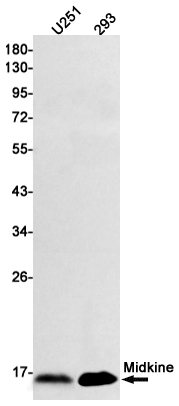
| WB | 咨询技术 | Human,Mouse,Rat |
| IF | 1/20 | Human,Mouse,Rat |
| IHC | 咨询技术 | Human,Mouse,Rat |
| ICC | 技术咨询 | Human,Mouse,Rat |
| FCM | 咨询技术 | Human,Mouse,Rat |
| Elisa | 咨询技术 | Human,Mouse,Rat |
| Aliases | MDK; FLJ27379; MK1; NEGF2; Midkine; NEGF2; ARAP |
| Entrez GeneID | 4192 |
| WB Predicted band size | Calculated MW: 16 kDa; Observed MW: 16 kDa |
| Host/Isotype | Rabbit IgG |
| Antibody Type | Primary antibody |
| Storage | Store at 4°C short term. Aliquot and store at -20°C long term. Avoid freeze/thaw cycles. |
| Species Reactivity | Human |
| Immunogen | A synthetic peptide of human Midkine |
| Formulation | Purified antibody in TBS with 0.05% sodium azide,0.05%BSA and 50% glycerol. |
+ +
以下是关于Midkine抗体的3-4篇参考文献及其简要摘要:
1. **文献名称**:*Midkine: A novel regulator of the inflammatory response in atherosclerosis*
**作者**:Wei X, et al.
**摘要**:该研究探讨了Midkine在动脉粥样硬化炎症反应中的作用,并通过抗Midkine抗体干预实验,证明其能显著减少巨噬细胞浸润和斑块形成,提示Midkine抗体在心血管疾病治疗中的潜力。
2. **文献名称**:*Anti-midkine therapy for neuroblastoma: Preclinical studies using a humanized antibody*
**作者**:Ikematsu S, et al.
**摘要**:研究开发了一种人源化Midkine抗体(MK-Ab),并在神经母细胞瘤小鼠模型中验证其疗效,结果显示MK-Ab可抑制肿瘤增殖并诱导癌细胞凋亡,为临床转化提供依据。
3. **文献名称**:*Midkine as a biomarker and therapeutic target in Alzheimer’s disease: Insights from antibody-based modulation*
**作者**:Yoshida Y, et al.
**摘要**:通过检测阿尔茨海默病患者脑脊液中的Midkine水平,并结合抗体阻断实验,发现抑制Midkine可减少β-淀粉样蛋白沉积,改善认知功能,表明其作为治疗靶点的价值。
4. **文献名称**:*Targeting midkine with a bispecific antibody enhances anti-tumor immunity in solid tumors*
**作者**:Li H, et al.
**摘要**:该研究设计了一种双特异性抗体(同时靶向Midkine和PD-1),在多种实体瘤模型中显示协同抗肿瘤效果,显著提升T细胞活性并抑制肿瘤生长。
---
以上文献摘要均围绕Midkine抗体的基础机制或治疗应用,涵盖心血管疾病、癌症、神经退行性疾病等领域,反映其广泛的生物医学价值。
Midkine (MK) is a heparin-binding growth factor belonging to a small protein family that includes pleiotrophin. Initially identified for its role in embryonic development, MK is minimally expressed in healthy adult tissues but is significantly upregulated in pathological conditions such as cancers, inflammatory diseases, and neurodegenerative disorders. It promotes cell proliferation, survival, migration, and angiogenesis by interacting with receptors like anaplastic lymphoma kinase (ALK), low-density lipoprotein receptor-related protein 1 (LRP1), and integrins. Its overexpression in tumors correlates with poor prognosis, metastasis, and therapy resistance, making it a promising therapeutic target.
Midkine antibodies are tools designed to detect or neutralize MK activity. Polyclonal and monoclonal antibodies against MK are widely used in research to study its expression patterns in tissues or biological fluids via techniques like ELISA, Western blotting, and immunohistochemistry. Therapeutically, MK-neutralizing antibodies have shown potential in preclinical studies, particularly in oncology. By blocking MK-receptor interactions or promoting antibody-dependent cellular cytotoxicity (ADCC), these antibodies inhibit tumor growth, angiogenesis, and metastatic spread. Additionally, they are being explored for treating inflammatory conditions (e.g., rheumatoid arthritis) and neuroprotective strategies, given MK's dual role in neuronal repair and neurodegeneration. Challenges remain in optimizing specificity and delivery, but MK antibodies represent a versatile avenue for both diagnostic and therapeutic applications.
×